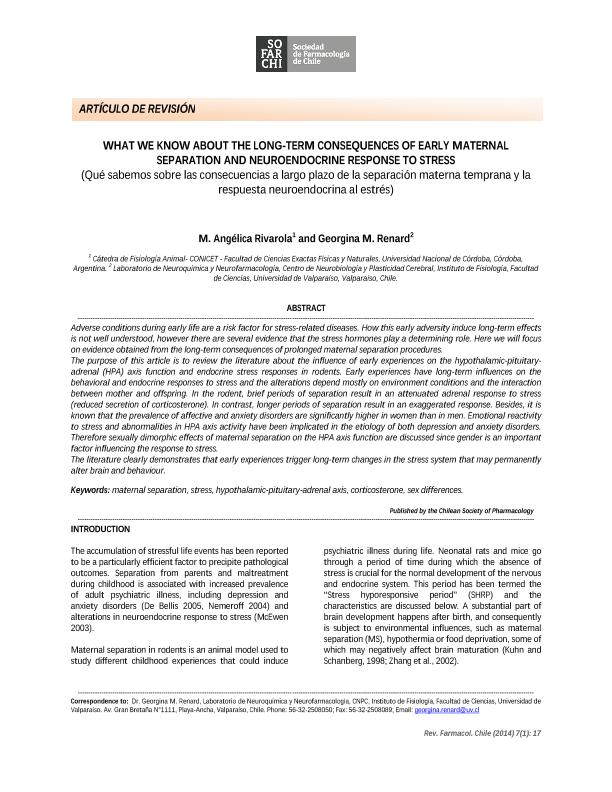Mostrar el registro sencillo del ítem
dc.contributor.author
Rivarola, María Angélica

dc.contributor.author
Renard, Georgina Maria

dc.date.available
2018-01-24T21:06:35Z
dc.date.issued
2014-04
dc.identifier.citation
Rivarola, María Angélica; Renard, Georgina Maria; What we know about the long-term consequences of early maternal separation and neuroendocrine response to stress; Sociedad de Farmacología de Chile; Revista de farmacología de Chile; 7; 1; 4-2014; 17-25
dc.identifier.issn
0718-8811
dc.identifier.uri
http://hdl.handle.net/11336/34523
dc.description.abstract
Adverse conditions during early life are a risk factor for stress-related diseases. How this early adversity induce long-term effects is not well understood, however there are several evidence that the stress hormones play a determining role. Here we will focus on evidence obtained from the long-term consequences of prolonged maternal separation procedures. The purpose of this article is to review the literature about the influence of early experiences on the hypothalamic-pituitaryadrenal (HPA) axis function and endocrine stress responses in rodents. Early experiences have long-term influences on the behavioral and endocrine responses to stress and the alterations depend mostly on environment conditions and the interaction between mother and offspring. In the rodent, brief periods of separation result in an attenuated adrenal response to stress (reduced secretion of corticosterone). In contrast, longer periods of separation result in an exaggerated response. Besides, it is known that the prevalence of affective and anxiety disorders are significantly higher in women than in men. Emotional reactivity to stress and abnormalities in HPA axis activity have been implicated in the etiology of both depression and anxiety disorders. Therefore sexually dimorphic effects of maternal separation on the HPA axis function are discussed since gender is an important factor influencing the response to stress. The literature clearly demonstrates that early experiences trigger long-term changes in the stress system that may permanently alter brain and behaviour.
dc.format
application/pdf
dc.language.iso
eng
dc.publisher
Sociedad de Farmacología de Chile
dc.rights
info:eu-repo/semantics/openAccess
dc.rights.uri
https://creativecommons.org/licenses/by-nc-sa/2.5/ar/
dc.subject
Maternal Separation
dc.subject
Stress
dc.subject
Hpa Axis
dc.subject
Corticosterone
dc.subject
Sex Differences
dc.subject.classification
Salud Ocupacional

dc.subject.classification
Ciencias de la Salud

dc.subject.classification
CIENCIAS MÉDICAS Y DE LA SALUD

dc.title
What we know about the long-term consequences of early maternal separation and neuroendocrine response to stress
dc.title
Qué sabemos sobre las consecuencias a largo plazo de la separación materna temprana y la respuesta neuroendocrina al estrés
dc.type
info:eu-repo/semantics/article
dc.type
info:ar-repo/semantics/artículo
dc.type
info:eu-repo/semantics/publishedVersion
dc.date.updated
2018-01-18T21:01:26Z
dc.journal.volume
7
dc.journal.number
1
dc.journal.pagination
17-25
dc.journal.pais
Chile

dc.description.fil
Fil: Rivarola, María Angélica. Universidad Nacional de Córdoba. Facultad de Ciencias Exactas, Físicas y Naturales; Argentina. Consejo Nacional de Investigaciones Científicas y Técnicas; Argentina
dc.description.fil
Fil: Renard, Georgina Maria. Universidad de Valparaíso; Chile. Consejo Nacional de Investigaciones Científicas y Técnicas; Argentina
dc.journal.title
Revista de farmacología de Chile
dc.relation.alternativeid
info:eu-repo/semantics/altIdentifier/url/http://www.sofarchi.cl/medios/revistas/farmacologiaendocrina/georenard.pdf
Archivos asociados
